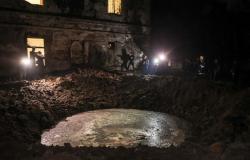Irene Leonor Flores de Callata (68) walks along a dry riverbed, and leads a herd of llamas and sheep through a long desert.
The indigenous people of Flores de Callata have for centuries climbed deep into the mountains of northern Argentina in search of a vital resource: clean drinking water.
Here, in one of the driest environments in the world, there is a life force that underpins everything. But indigenous communities like hers are increasingly worried that access to water will end.
Climate changes
That’s because the parched waterways around the city are connected to the vast white salt lakes below, underground lagoons of water packed with a metal that has come to be known as “white gold”—lithium.
The metal is a key in the global fight against climate change and is used in electric car batteries, solar and wind energy and other things. But to extract lithium, the mines suck water out of the flat terrain that surrounds thousands of indigenous communities, like that of Flores de Callatas.
The “lithium triangle” of Argentina, Chile and Bolivia is the largest lithium reserve in the world, and the world’s most powerful are increasingly looking to the region to extract the metal.
– We will lose everything. What will we do if we don’t have water? If the mines come, we will lose our culture, we will not be left with anything, says Flores de Callata.
Photo: AP/NTB” loading=”lazy”/>
White gold
Between 2021 and 2023, the price for a tonne of lithium at US
Facts about lithium
- Lithium is a silver-white metal and element with the atomic symbol Li.
- It is light enough to float in water, and is found in many natural salt solutions.
- Commonly found in nature, and is particularly extracted from salt lakes in Chile and Argentina.
- Is an important component in the production of batteries in electric cars, mobile phones and other electronics.
Source: Great Norwegian Lexicon
markets nearly tripled, reaching a high of $46,000 per ton last year, according to a report by the United States Geological Survey. In China, which buys the most lithium from the region, a tonne went for as much as 76,000 dollars at its highest last year.
Prices have since fallen, but governments, miners and companies from around the world have turned their attention to the lithium triangle. The US, China and others see the region’s desolate deserts as both a source of wealth and a driving force for the transition to green energy.
The white gold they are looking for is found in the hundreds of salt lakes, or salares, in the three countries.
From a distance, the salt lakes look like they are covered in snow, but beneath them are deep springs of salty groundwater packed with minerals. Unlike other forms of mining, lithium is not extracted from rock, but from the salt water pumped up from the lakes.
 Workers harvest salt at the Salinas Grandes salt flats in Jujuy, Argentina. Photo: AP/NTB
Workers harvest salt at the Salinas Grandes salt flats in Jujuy, Argentina. Photo: AP/NTBRepercussions

also read
Renewable energy slowed emissions growth
The problem is that the salt lakes also function as an important part of a very diverse ecosystem, say researchers AP has interviewed.
While the water inside the lagoons is not potable, they are connected to surrounding freshwater sources, which are vital to the survival of thousands of indigenous communities.
The concern from the researchers is that water pumping on an industrial scale both contaminates the fresh water with the brine they pump, and sucks the water out of the surrounding environment. This leads to major ripple effects for the region at a time when it is already affected by drought as a result of climate change.
The salt lakes are also an important part of a holiday for indigenous people that takes place throughout the month of August.
Giants
The town Flores de Callatas lives in is one of 38 located close to two such salt lakes – Guayatayoc Lagoon and Salinas Grandes – which provide income to the towns through tourism and small-scale salt harvesting.
For decades, such local communities have fought against large-scale mining and waged long battles in the judiciary to stop extraction projects, but they find that it is becoming more and more difficult to prevent the entry of the mining companies.
More than 30 companies have applied for permission to extract the water in the two salt lakes. The inhabitants of the city have put up signs along the lakes with the text “Respect our territory”. Get out, lithium company”.
– We defend our country. I’m not only worried about myself, but about all of us. If the mines come, it will affect the whole region, and by extension all the waterways, says Flores de Callata.
Will attract investors

also read
Agreement on ground rent tax on onshore wind: – Important change to get the development started again
The situation came to a head last summer when the local authorities, eager to make money from the mines, made it easier to renounce certain indigenous land rights and limited the ability to protest against expanded mining.
Lawyer Alicia Chalabe, who represents the local indigenous communities, and several others claim that this violates international law. Thousands of indigenous people protested and blocked the roads used by the mining companies.
The doors have been thrown wide open to the mining companies after Argentina last autumn got a new president, Javier Milei, as a result of his promise to fix the country’s declining economy.
Milei, who has described himself as an “anarcho-capitalist”, has announced broad deregulation measures that include reducing costs for mining companies in an attempt to lure investors to the country.
– Nightmare
For Flores de Callatas and her small town of Tusaquillas, the growing interest in the areas they consider home represents another nightmare scenario.
She wonders what will be left in 20 years.
– If the mines come, we will have money for a while. But then our grandchildren, our great-grandchildren – they are the ones who will suffer, she says.
– I will do everything I can to defend these areas, so that they still have these lands, so they still have their water.
 Workers carry out maintenance at a lithium mine near Peine in Chile. Photo: AP/NTB
Workers carry out maintenance at a lithium mine near Peine in Chile. Photo: AP/NTB
also read
– We will win










